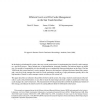Free Online Productivity Tools
i2Speak
i2Symbol
i2OCR
iTex2Img
iWeb2Print
iWeb2Shot
i2Type
iPdf2Split
iPdf2Merge
i2Bopomofo
i2Arabic
i2Style
i2Image
i2PDF
iLatex2Rtf
Sci2ools
117
click to vote
USENIX
1990
1990
Efficient User-Level File Cache Management on the Sun Vnode Interface
In developing a distributed file system, there are several good reasons for implementing the client file cache manager as a user-level process. These include ease of implementation, increased portability, and minimal impact on kernel size. For reasons of compatibility it is also desirable to use a standard file intercept mechanism on the client. The Sun VFS/Vnode file system interface is such a standard. However, this interface is designed for kernel-based file systems, and a user-level cache manager that used the Vnode mechanism would pay a large performance penalty due to the high number of kernel to cache manager context switches per file system call. This paper describes our solution to the problem for the Coda file system. By using a relatively small amount of kernel code to cache critical information, we are able to retain the much larger and more complex components of the Coda cache manager in a user level process. The measurements of Coda presented here confirm the performance...
| Added | 07 Nov 2010 |
| Updated | 07 Nov 2010 |
| Type | Conference |
| Year | 1990 |
| Where | USENIX |
| Authors | David C. Steere, James J. Kistler, Mahadev Satyanarayanan |
Comments (0)

